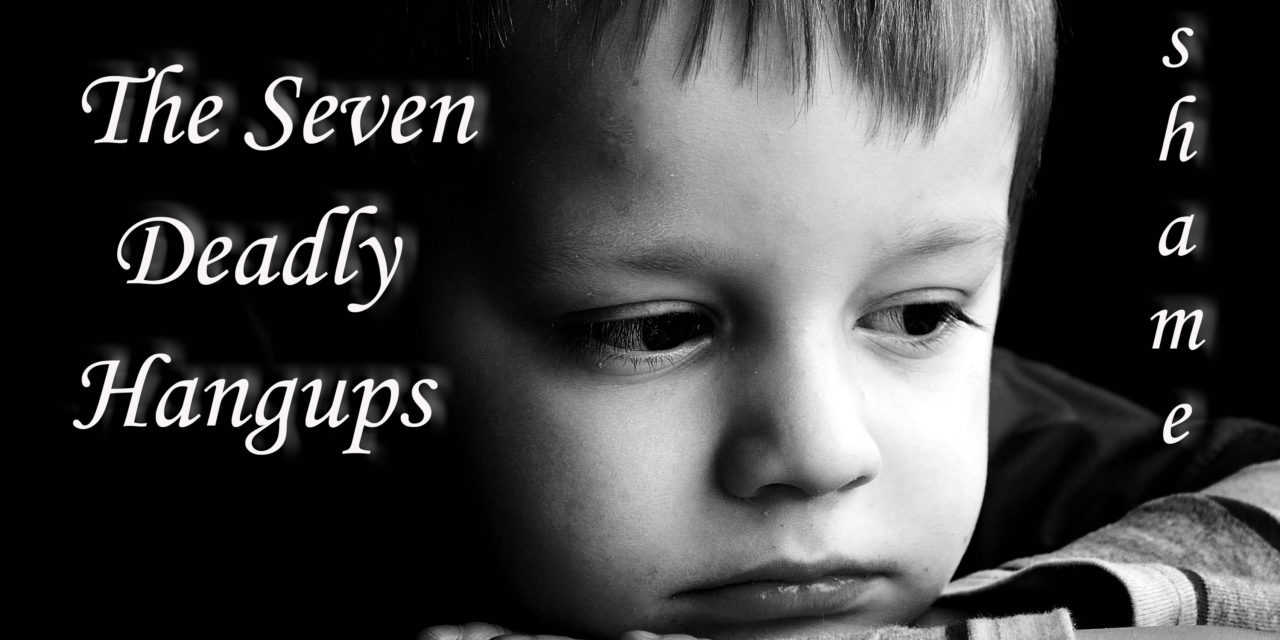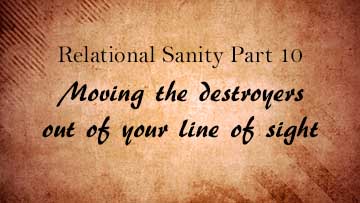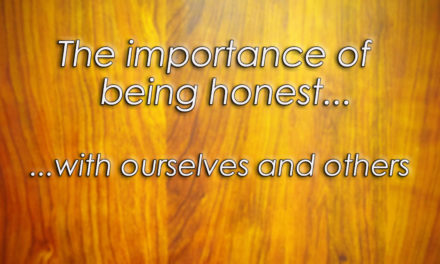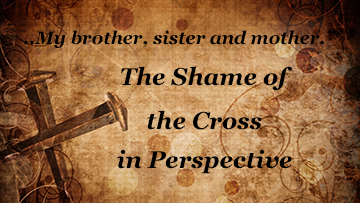This is the second part in a series concerning the mindsets that hold us back from growing in Messiah and becoming fully functioning members of the Body. Last time, I covered rejection but this time we are going to explore a much more complicated issue–shame.
You see, shame is the proverbial double-edged sword. Shame can be very good and shame can be very bad. The entire Bible was written from the vantage point of honor and shame, the ancient societal mindset that still governs two-thirds of the world today. In its proper context, shame can be a powerful force for good but, used improperly, shame can be crippling. Now, in the past, people who are not familiar with me or what I teach have made the accusation that I advocate a return to honor/shame dynamics but that’s absolutely untrue. The western world could not function sociologically that way, we just couldn’t. And frankly, I really wouldn’t want to! I teach the sociological context of honor and shame so that people can better understand the Bible, but anyone who suggests more than that is being untruthful. Anyone who has come from a shameful family past would want to avoid living in the type of society that takes “the apple doesn’t fall far from the tree” with deadly earnest. Western society judges people as individuals who make personal decisions to be good or bad, honorable or shameful, on their own. I like that.
But what I am wanting to discuss today has absolutely nothing to do with the Biblical concept of shame! So, if you are familiar with my teachings on that, just put that to the side. I am wanting to discuss modern shame from a Western standpoint–where there is a lot of overlap with ancient shame but also some very significant differences. People in the ancient world were not as introspective as we are and, if they were accepted by society, didn’t spend time feeling ashamed of themselves. They only cared about what other people thought about them.
So, what is shame? Let me start with an amusing example:
A lack of shame is why toddlers delight in streaking. I will never forget the day the Pastor’s daughter escaped from the group on the way to the nursery, ripped off her dress, and paraded nude and giggling through the sanctuary during services. To the delight, of course, of absolutely everyone in attendance. We were roaring with laughter–well, except for her parents. We all laughed because it wasn’t our kid. Shame is why an adult wouldn’t do the same, and why, if he or she did, no one would be laughing (except any teenagers in attendance).
You see, in this sort of situation, shame is good and a lack of shame is bad. There is nothing wrong with healthy societal norms that are enforced by a reasonable dose of community-implemented shame. Pedophilia was considered to be respectable in ancient Greece and expected even as one of the rights of adult males. If you tried to shame them over it, they would look at you like you were nuts. Nowadays, pedophiles go to extreme lengths to go undetected, because their actions are grossly shameful to us. In fact, they use a weaponized form of inappropriate shame in order to keep their victims from exposing them. They have shunned good shame and are using inappropriate shame in order to control. Their world is upside down and that is a big part of the reason why molestation victims have such a hard time healing and often offend themselves–their sense of shame is manipulated and warped out of shape.
So, we aren’t going to talk about good shame here, at least not yet. I want to talk about shame that was once good but has been held on to for way too long, past the point of usefulness, and shame that never should have existed in the first place–what I call inappropriate shame.
Inappropriate shame can come in many forms–I already mentioned one:
(1) When the victims of a crime are manipulated into feeling as though they are to blame for the actions of another. The Bible explicitly speaks against this–rape victims are labeled as innocent as murder victims. Deut 22:26 “But you shall do nothing to the young woman; she has committed no offense punishable by death. For this case is like that of a man attacking and murdering his neighbor…” Now, I know men and women who have been raped and children who have been molested–as well as teenagers who have been seduced by much older manipulators who took advantage of their position of authority. The shame lies with the person who had the intent to do evil, who chose evil actions. We would never shame a murder victim, nor does the family of a murder victim feel any shame. They feel grief. As a society, we need to look at this situation the way the Bible does and put all the shame on the person who did evil and give all our love and compassion to the person they victimized. To do otherwise is upside down and unbiblical. A good example, biblically, of handling this wrong is found in how King David handled the sexual assault of his daughter Tamar by his eldest son Amnon.
(2) Hanging on to shame over things we did as children. Oddly enough, we tend to look back on our own childhood with adult eyes–as though we knew then what we know now. Nonsense! We were foolish idiots, every single one of us. Whenever I am talking to people about the shame they feel over things they now regret having done as kids, I ask them if they would subject a child who is doing the same things now to the same sort of vitriolic abuse they are heaping upon themselves. Generally, they think about it and are horrified at the very idea of treating a child the way they treat themselves. At that point, I point out to them that they are doing harm to an innocent–the innocent just happens to be their younger selves. The repenting for the sins of their childhood has to end at some point, and they have to let that child go. Really, that child has been gone, dead and buried for a long time and only that child’s memories and scars remain. Let the child rest in peace.
(3) There are folks who are masters of inducing shame as a means of controlling others over debatable personal choices that are neither moral or immoral, and sometimes over choices that are flat out immoral. I will never forget the time my friend had breast cancer and had to undergo a radical double mastectomy to save her life. Well, miraculously she got pregnant the next year. She was on a mom’s forum and there was a woman there berating her because “breast is best” and that, and yes she actually said this, my friend was dooming her child to mental retardation and a lifetime of illness because her child would be formula-fed. I mean, it is ludicrous. If this was true then every adopted baby would be in the special needs classes and sickly. BTW, I was formula-fed because my mom was never able to maintain a milk supply and I am a college graduate and my first job out of college, where I graduated with a degree in Chemistry, was in aerospace research. My own exclusively formula-fed adopted son is currently getting a degree in Criminal Justice and Criminology and he never gets sick. But I mention this to point out that there are a lot of people out there who, in order to promote their choice, will ruthlessly shame everyone who doesn’t want to go along with it. The homosexual revolution has been chugging right along on the very successful trail blazed by trying to shame everyone who disagrees with their lifestyle. I have seen homeschoolers call public school kids “brainwashed zombies” and public schoolers calling homeschooled kids “unsocialized” and women with a lot of kids calling women with no or few kids selfish and sinning, and being called all sorts of silly things in return. Moms who decide not to vaccinate, or fully vaccinate, are called uneducated and their kids are called feral–and those who do are called uneducated and fearful tools of big pharma. How do we battle this sort of shame? Well, first we need to see it for what it is. It is propaganda and recruitment tactics. Instead of making a case for why their choice is best, or at least acceptable, they are making all other choices bad and shameful–no matter how silly. Learn to recognize when someone is manipulating you with inappropriate shame and refuse to accept it. Heck, call them on it. It was probably done to them and maybe they don’t even realize what they are doing, might be totally subconscious, but don’t play along. This shame doesn’t belong to you–it’s theirs. Just be sure not to turn around and do it to others. If someone isn’t comfortable enough with their positions and beliefs to stand alone in them, they will often try to shame people around them–but they can’t do it without your cooperation.
(4) Shame which does not lead to positive action is useless. In truth, we all acted like beasts before we were saved to a greater or lesser extent. Everyone. Dwelling on it is generally just a facet of being prideful. Let me explain. I can’t even begin to tell you how much it offends me to know what I am capable of without Yeshua/Jesus. And for years I tormented myself thinking about it, being embarrassed, absolutely drowning in humiliation. But it wasn’t leading to repentance–I was already repentant. I was already living my life differently and was determined never to do those horrible things again. The truth is that my shame was a cover-up for the absolute gall I felt toward myself at the reminder of the decisions I made. I was offended that I could be so stupid, so sinful, so unaware of common decency and kindness. It was all pride. The memory of my decisions was the unbearable proof of my need for salvation and the new creation life that comes with it. I didn’t like to acknowledge who I am without the Cross. I didn’t want to face the weakness, the cluelessness, the focus on fulfilling my desires, and the sometimes mindless lengths I would go to in order to get what I wanted or avoid what I wanted to avoid. But it was fruitless. My sins had long since been recognized and repented for and are no longer part of my life. To move on, I had to own who I was and stop being embarrassed by it because nothing can be done to change my past. Healthy shame can change our present and our future, but it can’t do a thing to change the past–UNLESS we can turn it into an opportunity to right a past wrong. And so this shame, like the aforementioned examples, is inappropriate and fruitless.
So, when should we feel shame? Frankly, when we are doing something wrong now, or when we have done something wrong in the past where we could make things right but don’t, or when we could provide someone with justice but refuse to. That’s what Yeshua was talking about here in Matthew 5:
23 So if you are offering your gift at the altar and there remember that your brother has something against you, 24 leave your gift there before the altar and go. First be reconciled to your brother, and then come and offer your gift.
Although we like to fool ourselves that telling God we are sorry is enough, this passage right here tells us that we aren’t completely right with God when we have wronged someone and don’t make it right before seeking restoration of our relationship with God. That’s what the sacrifices were about. Repentance and confession of sin happened first. The sacrifice was there to fix the broken relationship with God, the relationship that was damaged when we sinned. But Yeshua here tells us that before we can be right with God, it takes more than just saying we are sorry in secret–we have to go make things right with the person we hurt. I was reading a book once–I think it was Living on the Devil’s Doorstep. A man had participated in the commission a murder and had escaped his homeland only to come to salvation in Amsterdam, where he joined the ministry work there. But he was increasingly convicted of his guilt in the murder. He thought about the man’s family and that they deserved justice, that he had wronged them and needed to make things right. Finally, he decided to go back and take his legal punishment. We can only imagine how God used him in jail! Such a great saint! In the same way, people want to come to faith and simply forget the evils of their past but is it the right choice? Do we get to come before the altar with the blood of Christ while our victims are still wronged and call it good? What of them? Shame is a good thing in that case and we should always make restitution when we can. If it is impossible, we have to let that shame go. How terrible it is if we think we can get salvation and be on good terms with God while our victims are still suffering! What kind of salvation is that? We must always want justice for others just as we want it for ourselves.
That being said, we need to give ourselves justice as well and learn how to stop suffering for entirely wrong reasons.





















